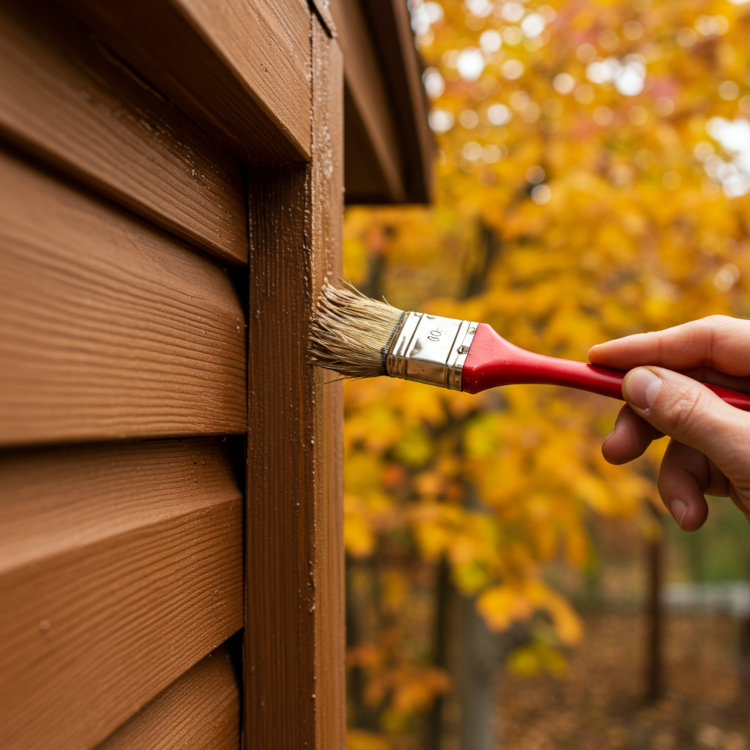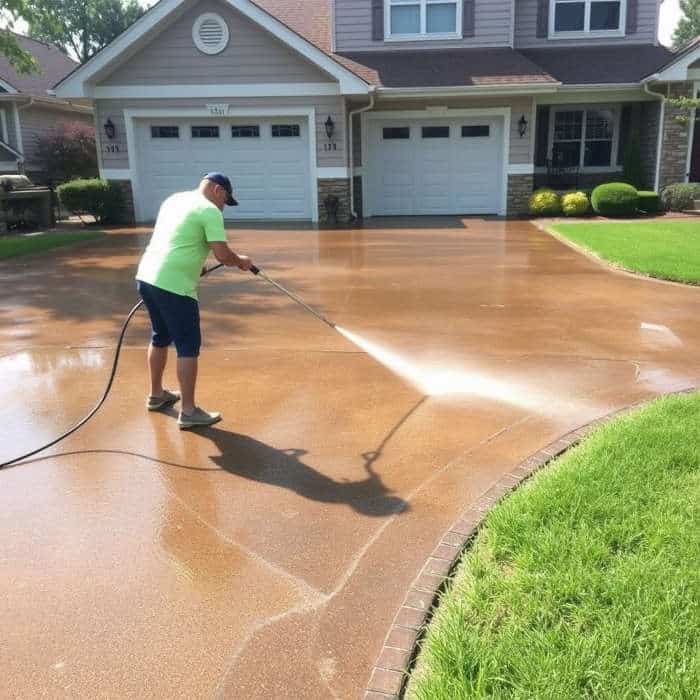As an Amazon Associate, I earn from qualifying purchases. Privacy Policy / Terms
Ohio winters can be unforgiving. Snow, ice, wind, and freezing temperatures put stress on every part of a home, especially the exterior. A fresh coat of exterior paint is not just about looks; it also acts as a protective barrier against moisture and cold. Preparing your home’s exterior before winter sets in helps prevent damage and extends the life of your paint job.
Why Winter Weather Damages Exterior Paint
Exterior paint faces many challenges during the colder months. Snow and ice introduce excess moisture, which can seep into small cracks or chips. When temperatures drop, that moisture freezes and expands, causing paint to peel or wood to crack. Constant cycles of freezing and thawing only make the damage worse.
Strong winds carry grit and debris that can scratch painted surfaces, while road salt and chemicals can also reach siding and trim, leaving behind stains. Without regular maintenance, these problems build up and lead to costly repairs.
The Role of Paint in Home Protection
Paint is more than a design choice. A well-applied coat acts as the first line of defense for wood, siding, and trim. Quality paint creates a seal that blocks out water and protects against UV rays. When it begins to break down, your home becomes vulnerable to moisture damage, pests, and structural wear.
By inspecting and protecting your exterior paint before winter, you give your home the durability it needs to withstand months of harsh conditions.
Inspect for Wear and Touch Up Early
The first step in protecting exterior paint is inspection. Walk around your home and look for peeling, cracks, or fading areas. Even small chips can let in moisture that causes larger problems later.
Professional exterior painters recommend addressing these issues in the fall, before snow arrives. Touching up paint or sealing vulnerable areas prevents damage from spreading during the coldest months.
Use Sealants and Protective Coatings
Protective coatings provide an extra layer of defense against moisture and frost. Clear sealants can be applied to siding and trim to repel water and reduce the effects of freezing temperatures. These coatings also help paint retain its color and sheen.
For homeowners who want long-lasting protection, professional painters may recommend specific products designed for Ohio’s climate. High-quality paints and protective finishes stand up to the region’s wet winters better than standard materials.

Keep Surfaces Clean Before Cold Sets In
Dirt, mildew, and debris on siding weaken the bond between paint and surface. Before winter arrives, it is smart to wash exterior walls and trim. Cleaning removes harmful buildup and prepares surfaces for sealants or touch-ups.
Many homeowners choose pressure washing to handle this step. When done correctly, pressure washing removes dirt and mildew quickly and leaves siding ready for protective coatings. Professional painters often use gentle washing methods or controlled pressure washing to avoid stripping paint while still clearing contaminants. A clean surface ensures coatings adhere properly and perform well through the winter months.
Maintain Trim, Doors, and Windows
Trim, doors, and windows are especially vulnerable in cold weather. These areas expand and contract as temperatures change, making them prone to cracks. Fresh caulk and sealant around joints help prevent drafts and keep moisture out.
Painting contractors often recommend focusing on trim and entryways as part of fall maintenance. A little attention here prevents expensive damage later.
Benefits of Protecting Exterior Paint Before Winter
Taking the time to protect your exterior paint has several lasting benefits:
- Shields your home against snow, ice, and moisture damage
- Reduces peeling, cracking, and fading in spring
- Extends the life of siding, trim, and woodwork
- Keeps curb appeal strong year-round
- Delays the need for a full repaint, saving time and money
These steps help homeowners protect both appearance and structure during the toughest season.
Plan Repaint Timing Around Seasons
Exterior painting is most successful when done in the right weather. Professionals recommend repainting during spring, summer, or early fall when temperatures are steady. Attempting to paint in freezing conditions leads to poor adhesion and short-lived results.
That is why fall preparation is so important. Touch-ups, sealing, and protective coatings in autumn carry your home through the cold months until a full repaint can be scheduled under better conditions.
Work With Professional Exterior Painters
While homeowners can handle some maintenance, professionals bring the expertise and tools needed for lasting results. Exterior house painters in Northeast Ohio know how to spot hidden trouble, apply protective coatings, and choose paints that stand up to local winters.
Working with a painting contractor also saves time. Instead of climbing ladders in cold weather, you can rely on experts who are trained to deliver safe and effective service.
Final Thoughts
Winter can be tough on exterior paint, but preparation makes a big difference. Inspecting for wear, sealing vulnerable areas, and applying protective coatings help your home stay strong through snow and ice. Clean surfaces, maintained trim, and timely touch-ups reduce damage and extend the life of your paint job.
With the guidance of professional exterior painters, your home will look fresh and stay protected all season long. By taking steps now, you avoid costly repairs later and keep your house ready to face another Ohio winter.
Views Expressed Disclaimer
The views, opinions, and information presented in this article are for informational purposes only and do not necessarily reflect the official policies or positions of Chagrin Falls Painting. While every effort has been made to ensure accuracy, Chagrin Falls Painting is not liable for any errors, omissions, or decisions made based on the content provided. Readers are encouraged to consult professionals for specific advice or assistance related to their unique circumstances.








